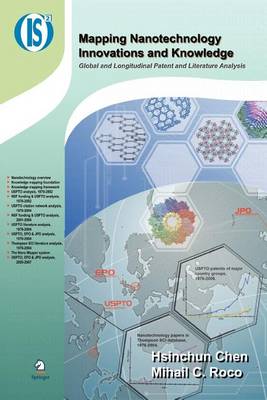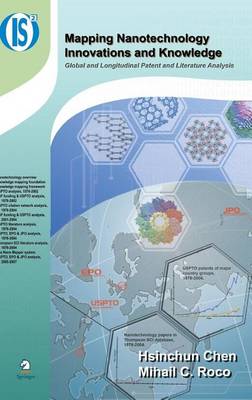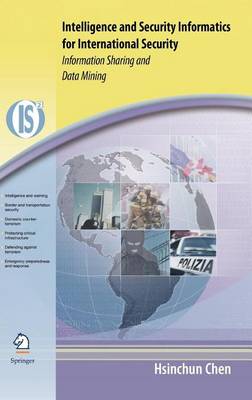Integrated Series in Information Systems
4 primary works • 6 total works
Book 10
Intelligence and Security Informatics for International Security
by Hsinchun Chen
Reflects a decade of leading-edge research on intelligence and security informatics.
Dr Chen is researcher at the Artificial Intelligence Laboratory and the NSF COPLINK Center for Homeland Security Information Technology Research.
Describes real-world community situations.
Targets wide-ranging audience: from researchers in computer science, information management and information science via analysts and policy makers in federal departments and national laboratories to consultants in IT hardware, communication, and software companies.
Book 20
Mapping Nanotechnology Innovations and Knowledge
by Hsinchun Chen and Mihail C. Roco
This book defines the application of Information Technology's systematic and automated knowledge mapping methodology to collect, analyze and report nanotechnology research on a global basis. The result of these analyses is be a systematic presentation of the state of the art of nanotechnology, which will include basic analysis, content analysis, and citation network analysis of comprehensive nanotechnology findings across technology domains, inventors, institutions, and countries.
Book 26
Sports Data Mining
by Robert P Schumaker, Osama K Solieman, and Hsinchun Chen
Data mining is the process of extracting hidden patterns from data, and it's commonly used in business, bioinformatics, counter-terrorism, and, increasingly, in professional sports. First popularized in Michael Lewis' best-selling Moneyball: The Art of Winning An Unfair Game, it is has become an intrinsic part of all professional sports the world over, from baseball to cricket to soccer. While an industry has developed based on statistical analysis services for any given sport, or even for betting behavior analysis on these sports, no research-level book has considered the subject in any detail until now.
Sports Data Mining brings together in one place the state of the art as it concerns an international array of sports: baseball, football, basketball, soccer, greyhound racing are all covered, and the authors (including Hsinchun Chen, one of the most esteemed and well-known experts in data mining in the world) present the latest research, developments, software available, and applications for each sport. They even examine the hidden patterns in gaming and wagering, along with the most common systems for wager analysis.
Book 30
The University of Arizona Artificial Intelligence Lab (AI Lab) Dark Web project is a long-term scientific research program that aims to study and understand the international terrorism (Jihadist) phenomena via a computational, data-centric approach. We aim to collect "ALL" web content generated by international terrorist groups, including web sites, forums, chat rooms, blogs, social networking sites, videos, virtual world, etc. We have developed various multilingual data mining, text mining, and web mining techniques to perform link analysis, content analysis, web metrics (technical sophistication) analysis, sentiment analysis, authorship analysis, and video analysis in our research. The approaches and methods developed in this project contribute to advancing the field of Intelligence and Security Informatics (ISI). Such advances will help related stakeholders to perform terrorism research and facilitate international security and peace.
This monograph aims to provide an overview of the Dark Web landscape, suggest a systematic, computational approach to understanding the problems, and illustrate with selected techniques, methods, and case studies developed by the University of Arizona AI Lab Dark Web team members. This work aims to provide an interdisciplinary and understandable monograph about Dark Web research along three dimensions: methodological issues in Dark Web research; database and computational techniques to support information collection and data mining; and legal, social, privacy, and data confidentiality challenges and approaches. It will bring useful knowledge to scientists, security professionals, counterterrorism experts, and policy makers. The monograph can also serve as a reference material or textbook in graduate level courses related to information security, information policy, information assurance, information systems, terrorism, and public policy.
Mapping Nanotechnology Innovations and Knowledge: Global and Longitudinal Patent and Literature Analysis
by Hsinchun Chen and Mihail C. Roco



